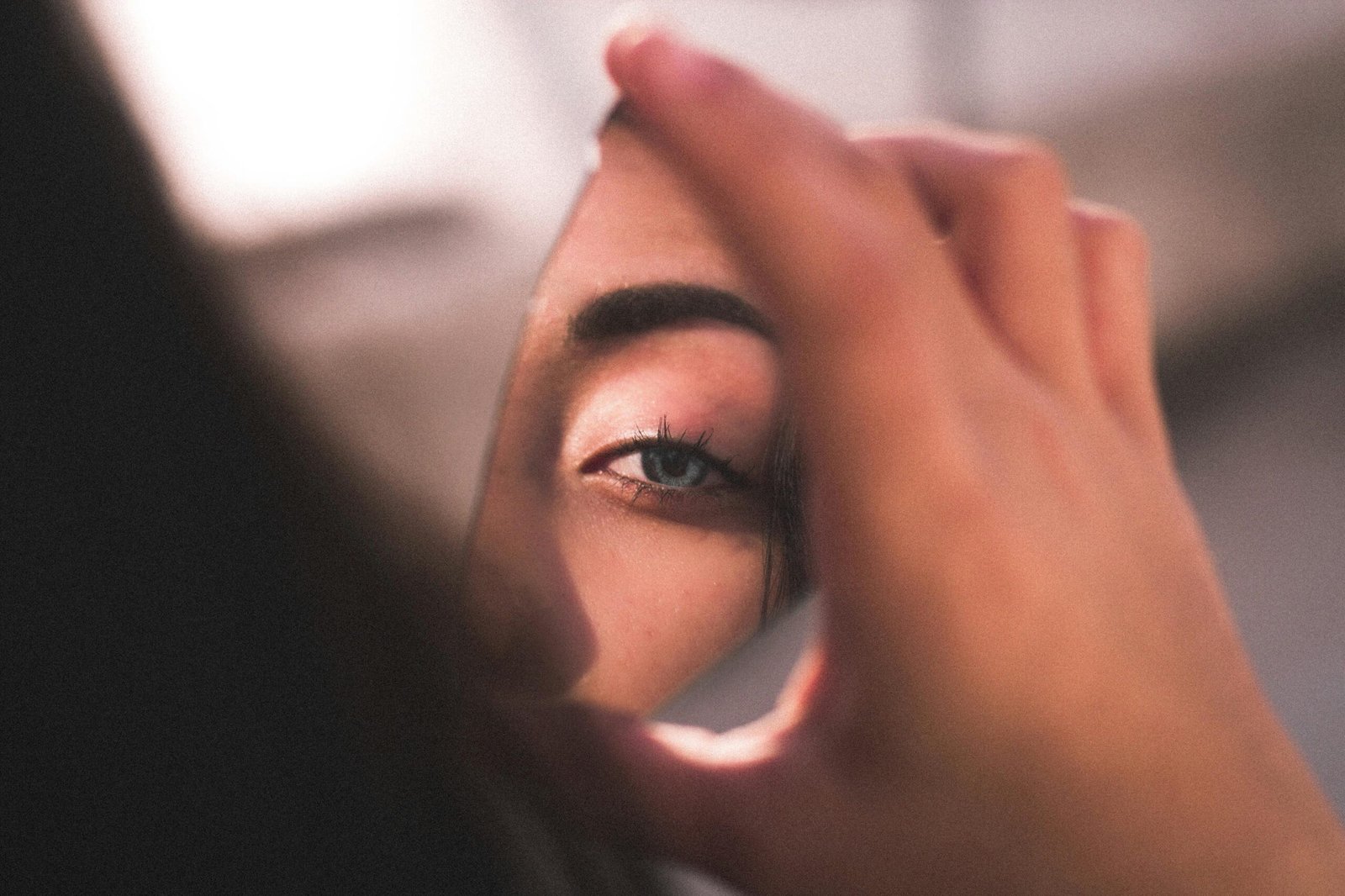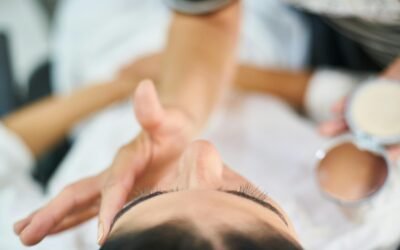What many people don’t talk about enough is the mental health side of acne, which takes a huge toll on people’s lives. For me, the impact on my self-esteem and confidence was far worse than the actual breakouts themselves.
I struggled with acne for around ten years, and even though my skin eventually healed, it took me far longer to rebuild my confidence and change the way I thought about myself. Looking back, I can see just how much my skin shaped my teenage years and early twenties. And after working with 100s of clients 1:1 over the years, I know that I’m not the only one whose mental health has been hugely affected by acne.
If your skin is affecting your confidence, you are not alone. I ask all of my 1:1 clients in their questionnaire, “How does your condition affect you?” Do you know what every single person writes? That it affects their self-esteem, their relationships, and their confidence. Every single person. You’re not alone with this.
My Acne Journey
Like many teenagers, I started getting a few spots when I hit puberty. At first, it was mild acne, nothing too dramatic, just the kind of breakouts you expect at that age. It didn’t massively affect me at the time, because I assumed it was just part of being a teenager.
But as I got older, my skin got worse.
By the time I was 16 or 17, I had discovered makeup and YouTube tutorials. What started out as fun hobby (I’d always loved art), playing around with eyeshadows and bronzer, quickly became more about covering up and making myself look perfect, rather than enjoying the creative process. Makeup wasn’t just something I did for fun anymore; it became something I’d hide behind. I wanted to look as flawless as possible, not because I loved experimenting, but because I was desperate to hide my acne.
When Things Got Worse
By the time I turned 19, my skin was really breaking out, and my confidence started to dip massively. I remember staying at a friend’s house one night and sleeping in my makeup – not because I was lazy or too tired to take it off after being out all night, but because I thought my skin looked BETTER with yesterday’s makeup still on. I didn’t want to reveal a few red spots, and I thought I looked better with panda eyes (from the smudged mascara) and some crusty foundation. Looking back, it makes me so sad how normal that felt to me at the time.
At that time, my friends all seemed to have perfect skin. I couldn’t understand why I was the one struggling when I was spending so much time, money and energy on skincare and treatments.
I tried everything. I copied my friends’ skincare routines, I bought expensive skincare products, I invested in good makeup, I had multiple skin peels. And yet my acne just would not go away.
The worse my skin got, the more I compared myself to other people. I’d walk into a room and immediately assume people were staring at my spots. If someone looked my way, I’d think “they’re looking at how bad my acne is.” But the truth is, they could have been looking at my outfit, my hair (and actually thinking I looked good!), or maybe not even at me at all.
That’s the thing about acne, it completely distorts your self-image. It convinces you that everyone else sees your skin the way you do, when in reality, most people probably don’t notice it nearly as much as you think – trust me.
Living With Acne as a Makeup Artist
After I finished school, I started working as a makeup artist. You’d think that learning all these techniques with makeup would help boost my confidence, but honestly, it made it worse.
I thought people would look at me and think, “She must be a rubbish makeup artist if she has acne.” I thought my makeup looked worse than other people’s because of my textured skin, at least that’s what I believed at the time.
Looking back now, I can see how untrue those thoughts were. In fact, I had become incredibly skilled at covering acne naturally, without it looking cakey. That’s a talent I could have shared with others, and it might have helped people who were going through the same struggles I was. But at the time, I was too embarrassed to show my skin with acne or to admit how much I was struggling.
There were even times when I asked to work in the stockroom instead of on the shop floor, just so I could hide away and not have to wear makeup.
Negative Self-Talk Makes Everything Worse
Here’s the thing I need you to know. Talking badly about yourself DOES NOT HELP.
Think about it for a second. Imagine you had a friend who told you every single day, “Your skin looks so bad. You’d be prettier if you didn’t have acne.” How would that make you feel? Pretty awful I’m guessing? You probably wouldn’t stay friends with that person if that’s what they said every time they saw you.
So why do we say those things to ourselves every day? Why do we wake up, look in the mirror and rip ourselves apart? All it does is trigger a stress response and make us feel even worse. And stress isn’t good for your skin. I really want you to think about it, because what does telling yourself you look ugly actually achieve, apart from making yourself cry?
I know you might be reading this and thinking, “Yeah but I am ugly with acne.” But are you? Do you look at other people with acne and think they look ugly? Or do you see someone with severe acne and think – Gosh that looks sore I wish I could help them clear it? Because that’s a normal person’s response. If someone is going to judge you purely for your skin, they are not the kind of person you want around anyway.
Even When My Skin Cleared, My Thoughts Didn’t
Something else I learned the hard way: clear skin doesn’t automatically equal confidence.
Even when my skin started to clear, those thoughts were still there. The subconscious belief that I was ugly, that my skin looked bad, that I wasn’t good enough. I would wake up, look in the mirror, and still tear myself apart pointing out flaws.
That’s when I realised it wasn’t just about skin. It was about the way I thought about myself. And if I didn’t fix that, I’d never feel happy.
How I Rebuilt My Confidence After Acne
After working on my subconscious thoughts and learning to reframe my mind, guess what? I actually don’t wake up and tear myself apart anymore. And do you know what else is amazing? I can get a breakout and not care. Yeah, I might see it and think, “That’s a bit annoying, I’ve got a spot.” But I don’t spiral.
Before, I would see a spot and immediately start thinking, “My acne is coming back, my skin is awful, I’m breaking out again.” I mean, how could I be a nutritional therapist who specialises in acne when I still get breakouts? Stress, stress, stress. And stress isn’t good for your skin. And you know what, the occasional breakout is normal. If anything, doesn’t it make you feel better that even I still get the odd spot come up when I’m due on my period? While your skin can be clear majority of the time, perfect skin doesn’t exist, guys.
I’m not a therapist, but I want to share what’s actually helped me.
1) Hypnotherapy
This was amazing for helping me reframe subconscious thoughts. It helped me challenge all the negative beliefs I’d built up over years of struggling with my skin.
2) Learning to take and accept compliments
Before, if someone said I looked nice or my makeup looked good, I would almost reject the compliment by saying something like, “Oh yeah, but look at this massive spot I had to cover.” I realised how much I was doing this and decided to just stop. I started saying thank you and genuinely accepting the compliment. It felt strange at first, but it works. Stop putting yourself down!
3) Therapy
There are loads of different types of therapy, and I’ve tried a few. But talking to someone about how you feel and learning tools to overcome your thoughts and feelings seriously helps. I’m now fully aware of the negative spirals that can happen when I get stressed and start telling myself how rubbish I am. I notice the thoughts happening, and now know how to self-regulate and stop them.
4) Practising gratitude
And I know this can sometimes seem ridiculous. But our brains have a negativity bias, meaning they naturally focus on the negatives. Gratitude helps to rewire your brain so you start noticing the positives more.
I know what it’s like to feel trapped, to think, “What can I be grateful for when I don’t have much money, my skin won’t clear, I’m single, or I’m just not happy with where I am.” I’ve been there, but I started small. I would write down things like, “I’m grateful I can see. I’m grateful I can hear the birds in the morning. I’m grateful for a warm bed.” Tiny things that you might think seem ridiculous to write down, but these are things we take for granted every day.
I’d recommend reading Rewire by Nicole Vignola to learn more on how to action these things.
Your Skin Can Heal & You Can Regain Your Confidence
It’s amazing how small changes like this can start to shift your mindset over time. One day you’ll wake up and mentally feel like a new person.
The truth is, we know acne affects more than just your skin. It affects how you feel about yourself, your confidence, your relationships, and even how you interact with the world.
If you’re reading this and you’re in the middle of it right now, feeling like your skin controls your life, I want you to know this: you are not alone. The feelings you have about yourself are valid. But they do not have to control you forever. Changing your mindset, working on how you speak to yourself, accepting compliments, practising gratitude, and seeking help where needed can make a massive difference.
You can get to a place where a breakout doesn’t ruin your day, where your confidence isn’t tied to whether your skin is looking and feeling perfect, and where you can actually enjoy your life again. It’s not an overnight fix – I’ve been working on all of this for over 10 years, but it is possible. And if I can do it after 10 years of struggling, so can you.





0 Comments